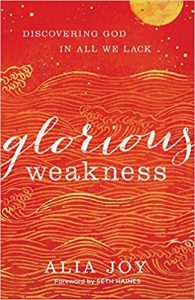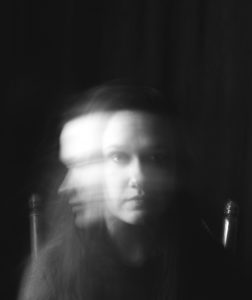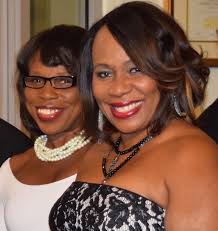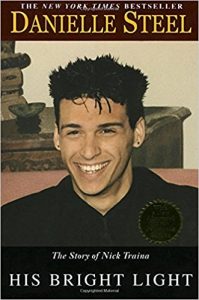Category Archives: mental illness
Glorious Weakness by Alia Joy
 Paperback: 240 pages
Paperback: 240 pages
Publisher: Baker Books
Price: $15.99
Purchase: Amazon | BN
Description
As a girl, Alia Joy came face to face with weakness, poverty, and loss in ways that made her doubt God was good. There were times when it felt as if God had abandoned her. What she didn’t realize then was that God was always there, calling her to abandon herself.
In this deeply personal exploration of what it means to be “poor in spirit,” Joy challenges our cultural proclivity to “pull ourselves up by our own bootstraps.” She calls on readers to embrace true vulnerability and authenticity with God and with one another, showing how weakness does not disqualify us from inclusion in the kingdom of God–instead, it is our very invitation to enter in.
Anyone who has struggled with feeling inadequate, disillusioned, or just too broken will find hope. This message is an antidote to despair, helping readers reclaim the ways God is good, even when life is anything but.
Review
It’s been a long time since I’ve come across a memoir which closely parallels my life and experiences. I feel like Alia Joy is my long lost soul sister.
She writes in the beginning of her book that Glorious Weakness is not for everyone. However, her book certainly was for me. And if others kept it real, they would see parts of themselves in her memoir, too.
Whether you’re a Christian or not, no one escapes pain and suffering in life. Pain and suffering is universal to the human experience that we all can identify to some level or degree. Alia had a fair share of it and then some. All of which I can relate to and identify with. It was as if she was writing my story.
Alia Joy’s writing style is descriptive and her use of metaphors is breathtaking. Her writing is poetic and lyrical. I enjoyed and relished reading her profound and touching memoir.
What I most appreciate about her memoir is that it’s not your typical Christian book. She doesn’t sugar coat anything.
I can’t relate to the popsicle Christian books being marketed and sold today. Glorious Weakness is real. Whereas, today’s Christian books lack depth, aren’t relatable and are impractical. Alia Joy’s book is the complete opposite. I have trouble sinking my teeth into those fluffy Christian books which make me sneeze with all their fuzzy platitudes.
Glorious Weakness is my kind of Christian memoir and I highly recommend it.
 Alia Joy is an author who believes the darkness is illuminated when we grasp each other’s hand and walk into the night together. She writes poignantly about her life with bipolar disorder as well as grief, faith, marriage, poverty, race, embodiment, and keeping fluent in the language of hope. Sushi is her love language and she balances her cynical idealism with humor and awkward pauses. She lives in Central Oregon with her husband, her tiny Asian mother, her three kids, a dog, a bunny, and a bunch of chickens.
Alia Joy is an author who believes the darkness is illuminated when we grasp each other’s hand and walk into the night together. She writes poignantly about her life with bipolar disorder as well as grief, faith, marriage, poverty, race, embodiment, and keeping fluent in the language of hope. Sushi is her love language and she balances her cynical idealism with humor and awkward pauses. She lives in Central Oregon with her husband, her tiny Asian mother, her three kids, a dog, a bunny, and a bunch of chickens.
Visit www.aliajoy.com.
Twitter: @aliajoy
What Mental Illness Should Not Be
I hear terms like, “the weather is so bi-polar,” or “I’m just a little OCD,” and I cringe. When people say things like this, they have no idea what they are saying.

Photo by Callie Gibson on Unsplash
Terms like these are used loosely all the time. For the record, there is no such thing as being a little OCD.
Just because you are clean and meticulous doesn’t mean you suffer from OCD. OCD is a serious mental illness and those who have it suffer a lot and it’s no laughing matter.
Being clean and organized has nothing to do with the fastidiousness of washing your hands countless times a day to the point of bleeding. Those who suffer from OCD will tell you unabashedly, it’s like living a reoccurring nightmare.
OCD is a debilitating disease that never goes away. And, as with most mental illnesses, there is no cure.
Sometimes people associate all mental illnesses with psychosis which is a separate diagnosis. Here is a short clip of what psychosis is like: https://www.bbc.co.uk/programmes/p0783qvh.
Society dumps everything in one batch. When they think bi-polar or schizophrenia, they automatically associate it with being “crazy or like I mentioned in my previous post, “Psycho.” But, nothing could be further from the truth.
Mental illness is the result of a brain disorder that affects your mood, thinking and behavior.
For example, with OCD, there’s a barrage of uncontrollable, reoccurring thoughts (obsessions) and behaviors (compulsions) that he or she feels the urge to repeat over and over. They can’t stop it or snap out of it either.
According to the National Institute for Mental Health, bi-polar disorder, also known as manic-depressive illness, is a brain disorder that causes unusual shifts in mood, energy, activity levels, and the ability to carry out day-to-day tasks.
Bottomline, mental illness (i.e., OCD, bi-polar, schizophrenia) should not be the butt of jokes, the brunt of mockery, or made light of nor misinterpreted, misrepresented or stigmatized. Because mental illness is not fun or funny. Those suffering from it live in constant torment and daily torture and they hide in shame and suffer in silence due to all the ignorance floating around.
Which is why I’m speaking up to help end the stigma on #MentalHealthAwarenessMonth.
I’m Coming Out. My Confession.
As a child, I remember thinking differently than my peers. I felt like an outsider. Like I was on the peripheral looking in at life happening around me. Sort of like watching a movie.

Photo by Ian Espinosa on Unsplash
By the time I reached junior high school, it worsened. I had confided in a school friend who would listen to me for hours while I lamented as tears ran down my face like a faucet.
I somehow had the wherewithal at fourteen to find a therapist which I paid for with my allowance I had earned by ironing my father’s shirts. She had diagnosed me with dysthymia (persistent mild depression). I saw her weekly until she fell asleep in one of our sessions.
In my late teens, I remember things becoming more pronounced. One day I would wake up full of energy and be ready to take on the world, and the next, I would feel utterly hopeless and depressed. There was no explanation for these extreme shifts in mood.
The fluctuating moods were accompanied by my loyal companions; fear, dread, worry and guilt. I didn’t know at the time I was struggling with anxiety until I had experienced my first panic attack in my late twenties.
By that time, I had become impulsive and spontaneous. I would feel a surge of energy pulsate through my body like electricity which made me feel invincible. There was so much I wanted to do and accomplish that I wouldn’t sleep.
I took unnecessary risks and made bad decisions that if it wasn’t for the grace of God, I’m sure things would have ended badly.
I was enthusiastic, adventurous and lived for the thrill of excitement. Everything I did was over the top, exaggerated and extreme. I flirted with danger because I was addicted to the adrenaline rush and loved the exhilarating feeling it gave me.
In this state, everything seemed alive and vibrant. Life was good.
Until it wasn’t…
It was only a matter of time until the dreaded crash came. I went from being high to drowning in a sea of hopelessness and sinking into a quicksand of despair. Everything around me became devoid of color; a still life black and white photo; grey, lifeless and dull.
The rollercoaster high’s and low’s kept happening, combined with an ever present restlessness and gnawing irritation, like stew simmering in a crockpot or a rumbling car motor that never seems to shut off or a dormant volcano brewing beneath the earth’s surface.
I lived like this for years not knowing why.
Fifteen years ago, things came to a head after giving birth to my eldest son. I had suffered from postpartum depression. My son was colic and would cry all night. I wasn’t getting any sleep and worked a stressful job. Between the lack of sleep and stress, I began to spiral. It was then that a therapist suggested I get evaluated by a psychiatrist.
After an hour and a half hour of what felt like an interrogation, I received the verdict. Her words shot out like fists punching my face.
I didn’t believe her, so I went for a second opinion and was given the same diagnosis.
********
After years of hiding behind the shame and living in silence, I decided to come out.
I’m a Christian who suffers with chronic pain and physical and mental illness. And I am not alone. There’s plenty of people out there struggling like me, who lurk in the shadows because of shame and fear of being found out.
They vacillate between denying their illness, pretending away their illness or praying away their illness, thus refusing treatment they so desperately need.
Instead, they self-medicate by either drinking, drugging, eating, spending or sexing.
*******
I’m speaking specifically to Christians right now, if you are struggling with mental illness, don’t allow the church or anyone from church tell you mental illness is a spiritual problem because it isn’t. Please don’t listen to anyone who tells you, you lack faith or you must have unconfessed sin or that you aren’t praying or fasting enough.
Mental illness is not a spiritual condition, but a medical one that needs to be treated like diabetes or cancer.
Please contact your local National Alliance for Mental Illness (NAMI) and get support. You don’t need to suffer in silence or struggle alone.
*******
Silence is the result of stigma and judgment by family members, friends, co-workers, church members, and society in general who aren’t educated and misunderstand, misinterpret, and marginalize those who suffer from mental illness or any invisible illness.
*******
Truthfully, these past two years have been the most difficult for me. My life has completely changed and it’s been hard for me to reconcile and adjust to. Believe it or not, it’s taken me over 15 years to finally accept my diagnoses.
I didn’t want to come out because most people walking around react to words like bi-polar, OCD or schizophrenia as a joke or they associate it with characters from “Psycho,” “One Flew Over the Cuckoo’s Nest,” or “A Clockwork Orange.”
This is why I’ve kept it hidden for so long, but now I no longer want to because there’s too many people suffering in silence. For this reason, I chose to come out and join the tribe of other voices advocating and fighting against the stigma.
If Only For One Night by Victoria Christopher Murray & ReShonda Tate Billingsley

Publisher: Brown Girls Publishing
Price: $15.00
Purchase: Amazon | BN
Description
Can they be soulmates if they’re married to other people? From the outside, Angelique has the perfect life – a rich husband who adores her and gives her the world, except for what she craves most – his attention. A workaholic, more concerned with his family’s financial situation than emotional stability, Preston doesn’t understand why his wife is so unhappy. Not one to stray, Angelique seeks comfort in the online game, Words With Friends. Blu has been living a life of loneliness since his wife settled into a depression she has no desire to shake. Frustrated and fed up, he loses himself in his favorite game – and the woman that has proven to be a formidable opponent. It’s not long before their online connection turns flirtatious and troubles at home lead them to a face-to-face meeting. And eventually an addictive connection that will have them questioning if they’re truly soulmates or if they were destined for only one night.
***Vlog Review: https://youtu.be/4YfS54ZbnB4***
Review
If Only For One Night was an interesting read. It was entertaining as well as challenging. I love reading fiction that makes you think. This story covers important topics such as marriage, love, soulmates, and mental illness, to name a few.
The story is about two married couples; Angelique and Preston, and Blu and Monica. Angelique loved her husband Preston, but paid more attention to his business than her. Blu loved his wife Angelique, but after having children, she was diagnosed with mental illness which negatively impacted their marriage.
Angelique and Blu were lonely and found solace playing an online game called, “Words With Friends.” It is there that they connected, flirted and eventually met in person.
Many things transpired after their initial meeting which kept you guessing. And, not for nothing, I did not see that ending coming. It was definitely a surprise.
I loved that it is clean fiction, and there is no profanity or graphic scenes. When someone is a good writer, all of that isn’t necessary to get the point across.
I am impressed by how the authors wove this story. The dynamic duo have a mean pen game and exceeded my expectations with, If Only For One Night. I highly recommend it.
Please be sure to click on the above link and check out my vlog review, where I go into more details about the story.
 Between them, National Bestselling and NAACP Award-Winning authors, ReShonda Tate Billingsley and Victoria Christopher Murray have more than two million books in print. The dynamic duo decided to combine their respective talents writing a number of books together, while maintaining their successful solo careers. Victoria, a former successful entrepreneur, also holds an MBA from New York University. ReShonda is a former TV journalist and marketing professional with over 25 years of experience.
Between them, National Bestselling and NAACP Award-Winning authors, ReShonda Tate Billingsley and Victoria Christopher Murray have more than two million books in print. The dynamic duo decided to combine their respective talents writing a number of books together, while maintaining their successful solo careers. Victoria, a former successful entrepreneur, also holds an MBA from New York University. ReShonda is a former TV journalist and marketing professional with over 25 years of experience.
His Bright Light by Danielle Steel
 Paperback: 336 pages
Paperback: 336 pages
Publisher: Delta; Reprint edition
Price: $10.69
Purchase: Amazon
Description
“This is the story of an extraordinary boy with a brilliant mind, a heart of gold, and a tortured soul. It is the story of an illness, a fight to live, and a race against death.
I want to share the story, and the pain, the courage, the love, and what I learned in living through it. I want Nick’s life to be not only a tender memory for us, but a gift to others. . . . I would like to offer people hope and the realities we lived with. I want to make a difference. My hope is that someone will be able to use what we learned, and save a life with it.”—Danielle Steel
From the day he was born, Nick Traina was his mother’s joy. By nineteen, he was dead. This is Danielle Steel’s powerful, personal story of the son she lost and the lessons she learned during his courageous battle against darkness. Sharing tender, painful memories and Nick’s remarkable journals, Steel brings us a haunting duet between a singular young man and the mother who loved him—and a harrowing portrait of a masked killer called manic depression, which afflicts between two and three million Americans.
At once a loving legacy and an unsparing depiction of a devastating illness, Danielle Steel’s tribute to her lost son is a gift of life, hope, healing, and understanding to us all.
***Vlog Review: https://youtu.be/YC8qgK_JpQQ***
Review
His Bright Light was written as a tribute to Danielle Steel’s son, Nick Traina who was born with bi-polar disorder and committed suicide at the age of nineteen.
This is a well written, detailed account chronicling his life and everything he/she went through trying to get help within the medical community. The failures and the successes, the ups and downs, the sadness and the joy.
It was heart wrenching and difficult for me to read. I had to put it book down a couple of times, because I felt bad for Nick and all he suffered, as well as Danielle Steel and her family.
Mental illness is real and it not only effects the person who is suffering from it, but it also impacts everyone else around them.
At that time, there wasn’t as much information regarding treating bi-polar disorder, (otherwise known as manic depression) as there is now. Although I’m grateful to see there have been strides in the medical field, there is still more to be uncovered and revealed regarding brain disorders.
I get into more detail about my thoughts in my vlog review.
If you want to learn more about what bi-polar looks like, I highly recommend His Bright Light.

